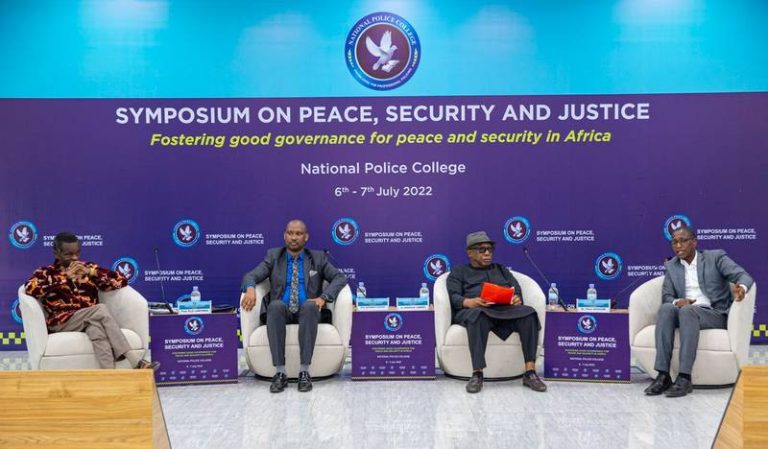
The National Police College (NPC) symposium on peace, security and justice concluded on a high note, with scholars, academicians and experts exploring two key areas; media and governance in contemporary Africa—opportunities and challenges; and rethinking peaceful and secure Africa—good governance in perspective.
The Minister of Local Government, Jean Marie Vianney Gatabazi, while officially closing the two-day symposium in Musanze District, reiterated that governance is an important factor for peace and stability and that these concepts remain complementary, interrelated, interdependent and are mutually reinforcing imperatives for sustainable development in Africa and elsewhere in the world.
The ninth symposium for the 10th intake of the Police Senior Command and Staff Course (PSCSC) was held under the theme “fostering good governance for peace and security in Africa.”
“In different African countries, persistent conflicts are customarily associated with poor governance, which fails to address the basic human security needs, root causes of conflicts like marginalization, equal access to opportunities and resources, inclusiveness, equal protection by the laws,” Minister Gatabazi said.
In addition to the internal drivers of conflicts, he added, the failure for some countries to identify what they stand for in terms of value and national interests has led them to succumb to the pressure of external powers.
Regardless of the hindrances caused by the media to stability and social order amongst the citizens, Minister Gatabazi said that it also plays a significant role in shaping and strengthening good governance.
“In rethinking of a peaceful and secure Africa, there is always a compelling need to address governance-related root causes of conflict in order to effectively foster sustainable peace and security as a route to lasting development on the continent.
This requires enhancing human security centered governance; promoting and controlling professional media platforms; establishing capable and accountable public institutions including the security organs; and building strong and fair judicial systems that are responsive to the citizens,” the Minister emphasized.
Panelists’ insights
The Inspector General of Police (IGP) Dan Munyuza, while tackling the issue of “ensuring peace and stability in Africa: emerging regional and continental initiatives,” observed that for decades, African continent has been characterized by conflicts, shifting from interstate to intrastate in nature.
“Rwanda’s commitment to participating in peacekeeping operations is informed by its tragic history of the 1994 Genocide against the Tutsi. It is motivated by a strong national belief in the protection of civilians as espoused in the 2015 Kigali Principles that focus primarily on ensuring the effective protection of civilians,” IGP Munyuza said.
He added that after a long period of Africa being taken care of by other countries outside the continent, African states through African Union have started taking their destiny in their hand. The slogan “African solutions to African challenges” has started materializing.
“This is because Africa is now contributing up to 80% of UN peacekeeping missions in Africa. There is also a growing commitment of Regional Economic Communities (RECs) to engage more in resolving conflicts on the continent, which is commendable.
The regional ad hoc security initiatives are becoming more frequent, and may in the near future be seen as standard practice, rather than exceptions. The emerging bilateral initiatives are proving to produce results beyond even multilateral approaches. They will only require international support and much clarity from the UN Security Council in terms of their mandate, oversight, command and control, and reporting,” the Police Chief said.
Prof. Patrick Loch Otieno Lumumba, in his insight on “strengthening judicial system in Africa—an imperative for good governance, sustainable peace and security,” remarked that justice has been identified as the cornerstone of the rule of law, underpinning all efforts to achieve international peace and security.
“Critical to establishing peace and the necessary confidence between state and citizen is providing a sense of security, freedom from fear, and the protection of basic rights and entitlements,” Prof. Lumumba said.
He added that conflict can only be ‘managed’ peacefully if there exist capable institutions that can define and enforce rights and obligations. “Security and justice are therefore inseparable – security efforts should be aimed at securing just outcomes through just processes, justice efforts should see human security as a basic human right.”
Prof. Alfred R. Bizoza, Agricultural Economist and Policy Analyst at the University of Rwanda, said that the current discourse on human security has broadened from concerns with military-defense issues to issues of human health security, food security, economic security, and environmental security, among others
Prof. Neil Cooper, the director of the School of Peace and Conflict Studies (SPCS) at Kent State University in Ohio—USA, in his reaction to “good governance as a critical factor for peace and stability in Africa—the nexus,” said that the concepts of peace, security and governance are not fixed, unstable and are constantly shifting.
“Trends in peace and security are not fixed–and many global metrics of peace and security are going in the wrong direction… but politics and policy matters in terms of influencing trends in peace and security,” Prof. Cooper said.
Renowned journalist and author, Charles Onyango Obbo, while discussing on ‘social media and governance in Africa—a critical appraisal,’ said that it has provided another platform as a leader in bringing accountability especially in once inaccessible spaces, exposes brutality, a great environmental watch, best election observer and a tool against gender-based violence. (End)
